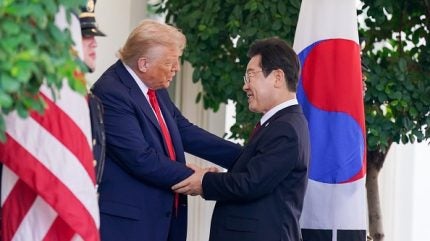
As the US and South Korea continue to hash out the specifics of the trade deal agreed upon this past July, the Asian country is reviewing the details of its $350bn (Won499.64trn) investment pledge to the US, which has become a sticking point during talks.
During a parliamentary session on Monday, South Korean Foreign Minister Cho Hyun said Washington had “brought a new alternative”, which the government was reviewing.

Discover B2B Marketing That Performs
Combine business intelligence and editorial excellence to reach engaged professionals across 36 leading media platforms.
The need for a currency exchange with the US, given the asymmetry between the country’s foreign exchange reserves and US President Donald Trump’s investment demands, was also discussed. South Korea has noted that barring a currency swap, the proposed investments would account for more than 80% of the country’s foreign currency reserves.
From the onset of the trade deal, South Korea highlighted that the $350bn topline figure would comprise a mix of investment, loans and loan guarantees. The US demanded that the entire amount be given through direct investment, which Cho said could have detrimental impacts on South Korea’s economy.
Deputy Prime Minister Koo Yun-cheol said the biggest direct investment South Korea could make in the US would be $20bn, less than 6% of the full amount Washington wanted.
The trade deal reached in July lowered US tariffs on South Korea’s goods from the 25% that was initially announced to 15%. The investment pledge was a core tenet of the agreement, similar to deals reached with Japan and the EU.

US Tariffs are shifting - will you react or anticipate?
Don’t let policy changes catch you off guard. Stay proactive with real-time data and expert analysis.
By GlobalDataThe numbers drew scrutiny from experts who highlighted the unfeasibility of such high investment figures.
David Oneglio, director of European and global economics at TS Lombard, said that the EU’s €750bn ($867.91bn) investment commitment to energy imports is “unachievable not only because EU demand cannot grow that much but also because US exporters cannot supply that much either”.
In an opinion piece for this publication, vice-president of corporate strategy and development at a German Mittelstand company and FDI expert Martin Kaspar highlighted how the US’ penchant for headline-making investment announcements did not match actual foreign investment flows into the country, which have slowed since the start of Trump’s second term.





